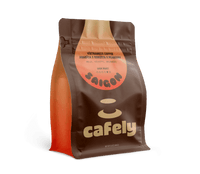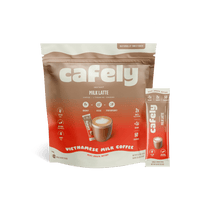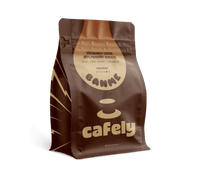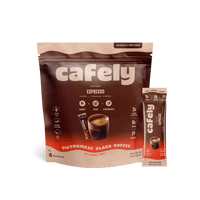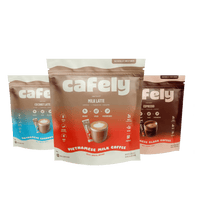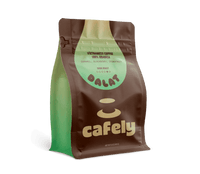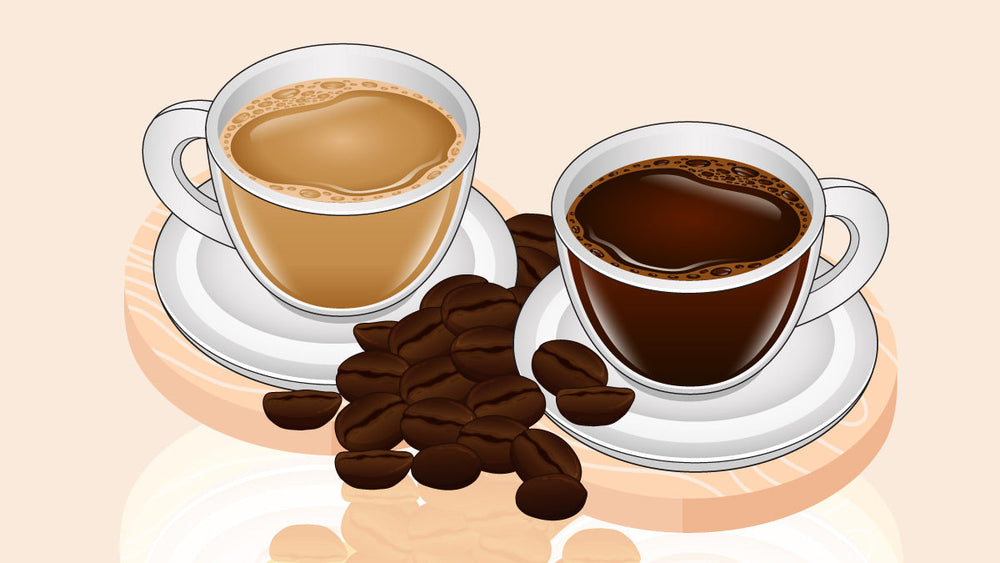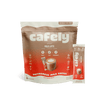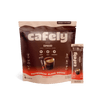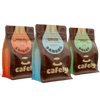If you're suffering from acne, it can really impact your confidence and self-image. It's only natural to consider looking for the cause, so you may suspect your daily habits — like drinking coffee — are to blame.
In this article, we’ll explore how coffee might impact your skin and delve into the science behind it. We’ll also look at other possible causes of acne and ways you can combat it.
Can Coffee Cause Acne?
Breakouts are a real frustration for lots of people, with one study finding around 17 million Americans have acne [1].
It's fairly common to think that different foods or drinks, including chocolate and coffee, cause or worsen acne. But is this fact or fiction?
To make a long story short, no, coffee doesn’t directly cause acne. However, it may worsen acne if you already have it, particularly if you drink too much and put lots of added cream and sugar into your drink.
While no studies directly research the link between coffee and acne, the root causes of acne have been studied, as have several key ingredients in coffee. By comparing these pieces of research, we can draw some conclusions.
The Different Factors at Work
The different elements of any given coffee drink may impact your skin in different ways. Some ingredients could benefit your skin, while others may be damaging overall.
Coffee is composed of many different compounds, and it gets even more complicated when you add cream and sugar.
To simplify, let's discuss some key ingredients and compounds and how they may impact your skin.
Caffeine

Caffeine is the headline ingredient in coffee — that sweet chemical that helps us get out of bed in the morning to tackle the day head-on. For all its benefits, though, caffeine may negatively impact your skin since it can trigger a stress response.
Stress doesn't directly cause acne but can exacerbate it if you're already dealing with it [2].
One of the main reasons for this is that stress hormones (of which cortisol is the most famous) may boost your sebaceous glands, leading to higher oil production on your skin, clogging pores, and worsening acne [3].
Caffeine can also affect sleep and sleepiness, especially if you’re drinking too much coffee.
If you’re not sleeping enough, your body may trigger a stress response, which can lead to that same increased oil production. However, caffeine impacts people’s sleep differently, so it may not be the chemical's fault directly, but it may not be helping you out.
Antioxidants
Coffee is a huge source of antioxidants, with many of these compounds in each cup. Antioxidants float around your body and interact with free radicals, neutralizing them before they can harm your system.
There may be a correlation between the amount of antioxidants in your system and the severity of your acne. In 2006, researchers studied 200 people, 100 with acne, and 100 without [4]. The researchers found those with acne had noticeably lower concentrations of certain antioxidants than the control group.
Though this research isn't conclusive, it suggests that getting a few more antioxidants in your system can be very healthy. So, it may be worth opting for a cup of coffee or two to benefit your overall health.
Milk
Milk may have a hormonal impact on the body, directly or indirectly, which may exacerbate skin issues. One study reviewed data compiled from 47,000 women who were diagnosed with acne when they were teenagers [5]. The study asked what the women ate and drank as teens. What was the one major factor these women had in common? The women who consumed more milk during their teenage years had acne more often than the women who didn’t.
In the study, the researchers comment that milk's hormone content may trigger acne. However, it's hard to say how much of a role it truly played. Plus, since the study took place on adults remembering their teenage years, it's tough to say how accurate the remembered data on milk consumption is.
This study was followed by a number of others, with skim milk found to be worse than low-fat or full-fat milk for correlating with acne [6, 7]. In fact, one study found that girls who drank two or more servings of skim milk every day were 22 percent more likely to have severe acne. They also found that those same girls were 44 percent more likely to have cystic or nodular acne when compared to girls who only had one glass of nonfat milk.
Sugar
The same can be said for sugar, which is very common in a lot of coffee drinks, particularly barista-made drinks from chain coffee stores.
A high-sugar diet leads to a greater amount of insulin in the body. After insulin makes it to the bloodstream, your body releases a hormone called IGF-1, which is known to play a role in the development of acne [8].
What Causes Acne?
Acne is such a ubiquitous skin condition that many different tales and theories attempt to explain where it comes from and why it might stick around. Forgetting homespun theories for a moment, what does science say about the cause of acne?
At the most basic level, acne is a condition that occurs when the pores of the skin become blocked in some way.
This blockage can happen for a number of reasons, but there are three big ones:
- Oils — Oil blocking your pores could come from regularly touching your face or from follicles producing too much oil.
- Dead skin — Dead skin cells can accumulate in your pores naturally, but are typically washed away. However, too much of it builds up and can block your pores.
- Bacteria — If your pores are blocked for any reason, bacteria can build up and block oil from escaping, forming pimples.
Glands in your skin produce oil naturally to help keep your skin hydrated and soft. This evolved as a way to ensure our skin remains flexible and elastic. When the gland produces the oil, it travels out of a pore and onto the skin. If the path is blocked, a spot can happen.
What Are the Risk Factors?
Frustratingly, no one is quite sure of the exact reasons why some people get more acne than others. However, most of the leading dermatologists highlight a number of risk factors that may contribute to acne worsening over time.
These factors can generally fall into two categories: substances blocking the pores and hormonal changes.
Many things can block your pores, including skin cells, bacteria, heavy creams, and beauty products. If the pores are blocked, the oil produced under your skin cannot properly get to the surface.
Hormonal changes can occur for any number of reasons, from pregnancy and puberty to poor sleep and certain medications. The endocrine system is very complex and interconnected, making it hard to study. However, hormonal fluctuations may lead to changes in the skin, and these changes can lead to acne.
How Can You Combat Acne?
Thankfully, there are many ways to combat acne for those of us looking to get on top of it.
Your doctor may be able to help with medication, though this may not be suitable for everyone. Several different types of acne medications help dry out your skin.
One of the strongest medications, Accutane, has a number of potential side effects, so it's typically a "last resort."
Regular hygiene and skin care are essential if you want to combat acne without a doctor's visit.
One simple method that helps a lot of people is to start exfoliating — this is the process of scrubbing your face to remove some of the dead skin cells and oil build-up.
Since these two things can contribute to acne, removing them can effectively prevent further acne and remove spots you currently have.
Suggested: How to Make a Coffee Scrub for Healthier Skin
How to Select a Coffee That’s Good for You

Finding a healthy coffee can be complex. There are a number of factors to consider — some are objective, and some are more subjective.
There are a couple of key points to think about when looking for a coffee that has less impact on your skin.
Here are some things to keep in mind:
- Origin — To find coffee packed with healthy compounds like antioxidants, look for beans from a region with volcanic soil, such as the Vietnamese highlands. Volcanic soil is fertile and full of beneficial minerals, so plants grown with it can similarly be packed with powerful compounds.
- Fairtrade — The Fairtrade organization ensures that coffee farmers and processors are paid a fair rate. Rather than rushing to harvest, farmers can take a little extra time to ensure the beans ripen a little more. This makes them sweeter and can cut the amount of sugar you add to your coffee.
- Roast level — Roast level can also increase sweetness, as natural sugars in the beans become more caramelized and noticeable at darker roasts. If you’re aiming to reduce your sugar intake, try a Fairtrade dark roast.
- Bean type — While there are lots of types of coffee, the two most commonly used are robusta and arabica beans. Robusta beans contain about twice as much caffeine, while arabica beans have more fat and sugar. To combat acne, you might opt for arabica beans due to their natural sweetness.
- Organic — Organic beans are grown with as few human-made chemicals as possible. This means the crops tend to take a little longer to ripen, which can also naturally increase the beans' sweetness.
- Mold-free — Some crops can experience a small amount of mold growth when shipped, which can lead to mycotoxins settling in them. To prevent these mycotoxins from getting into your coffee, look for coffee beans that have been tested and certified mold-free.
Suggested: Healthy Coffee Choices — Top Picks for Taste & Wellness
FAQs — Can Coffee Cause Acne?
We’ve delved into the complex links between coffee and your skin, let’s address some FAQs.
1. Does Drinking Coffee Cause Acne?
No, drinking coffee doesn’t cause acne. If you already have acne, though, it may exacerbate the issue through caffeine, milk, and sugar’s respective impacts on the body.
2. Does Cutting Out Coffee Help Acne?
It can help acne for some, but this may be because of the milk and sugar in their coffee. Dairy milk and sugar are thought to have hormonal impacts on the body, possibly triggering acne in some people.
3. Can Drinking Coffee Help Clear Skin?
Drinking coffee may help some people clear their skin. Coffee contains a lot of antioxidants, and a high level of antioxidants in the system has been linked to a reduced chance of acne.
4. What Drinks Make Your Face Break Out?
The primary consumable drivers of acne are dairy milk and sugar. Milk contains many hormones, which scientists suspect play a role in triggering acne. Sugar leads to the production of insulin and, in turn, IGF-1, another hormone known to play a role in the development of acne.
5. Will My Skin Look Better if I Stop Drinking Coffee?
Your skin may or may not clear up when you stop drinking coffee, depending on what you add to it. Milk and sugar are both thought to contribute to acne’s development, so if you simply remove them from your coffee, you may see an improvement.
6. What Causes Acne on the Face?
Many things can cause acne on your face, but it’s typically caused by the normal function of oil glands being prevented via blocked pores. To combat this, consider regularly exfoliating to keep your pores clearer.
7. How Do You Treat Hormonal Acne?
General acne is caused by blocked pores, which trap oil in your skin. Hormone changes can increase the amount of oil your skin produces, exacerbating the problem. Many causes of hormonal acne cannot be treated, but you can try to improve it by getting enough sleep and reducing stress.
8. Is Cutting Out Coffee Good for You?
Cutting out coffee can be good or bad for different reasons. Some people find that a lot of coffee in their system negatively impacts their anxiety, while others see benefits from the antioxidant-dense liquid. If you have concerns about coffee's impact, consider speaking with a doctor for tailored advice.
9. Is Tea Good for Acne?
Yes, tea can be very good for acne. Tea, particularly green tea, is full of antioxidants and anti-inflammatory properties, which can reduce acne over time.
10. What Are the Side Effects of Coffee?
The main negative side effects of coffee come from the caffeine intake. When people have too much caffeine, they often feel very anxious or jittery, which can be extremely unpleasant.
References
- Spencer, E. H., Ferdowsian, H. R., & Barnard, N. D. (2009). Diet and acne: A review of the evidence. International Journal of Dermatology, 48(4), 339-347.
- U.S. Department of Health and Human Services. (2025, January 8). Acne. National Institute of Arthritis and Musculoskeletal and Skin Diseases.
- Borzyszkowska D, Niedzielska M, Kozłowski M, Brodowska A, Przepiera A, Malczyk-Matysiak K, Cymbaluk-Płoska A, Sowińska-Przepiera E. Evaluation of Hormonal Factors in Acne Vulgaris and the Course of Acne Vulgaris Treatment with Contraceptive-Based Therapies in Young Adult Women. Cells. 2022 Dec 16;11(24):4078. doi: 10.3390/cells11244078. PMID: 36552842; PMCID: PMC9777314.
- Abdel-Latif, N., & Abdul-Razzak, K. (2006). Does the plasma level of vitamins A and E affect acne condition? Clinical and Experimental Dermatology, 31(3), 430-434.
- Adebamowo CA, Spiegelman D, Danby FW, Frazier AL, Willett WC, Holmes MD. High school dietary dairy intake and teenage acne. J Am Acad Dermatol. 2005 Feb;52(2):207-14. doi: 10.1016/j.jaad.2004.08.007. PMID: 15692464.
- Adebamowo, C. A., Spiegelman, D., Berkey, C. S., Danby, F. W., Rockett, H. H., Colditz, G. A., Willett, W. C., & Holmes, M. D. (2008). Milk consumption and acne in teenaged boys. Journal of the American Academy of Dermatology, 58(5), 787.
- Ismail, N. H., Manaf, Z. A., & Azizan, N. Z. (2012). High glycemic load diet, milk and ice cream consumption are related to acne vulgaris in Malaysian young adults: A case control study. BMC Dermatology, 12, 13.
- Melnik, B. C., & Schmitz, G. (2009). Role of insulin, insulin-like growth factor-1, hyperglycaemic food and milk consumption in the pathogenesis of acne vulgaris. Experimental Dermatology, 18(10), 833-841.
